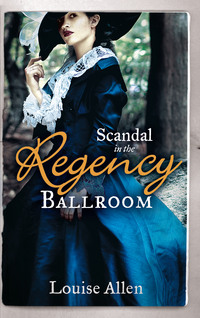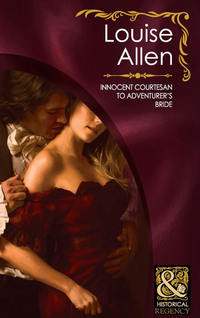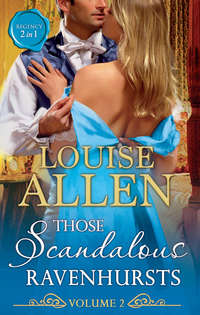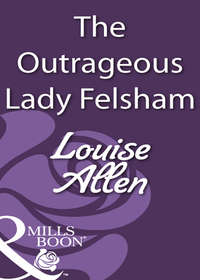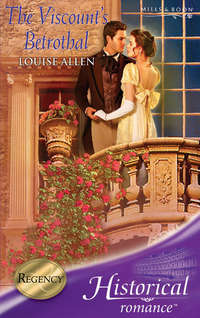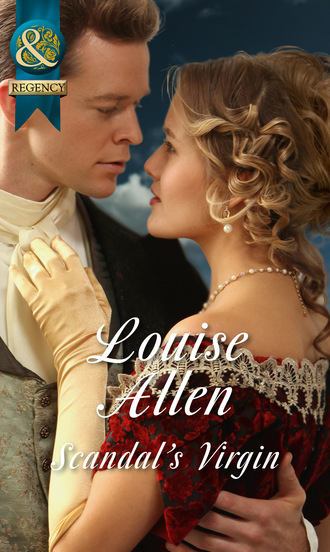
Полная версия
Scandal's Virgin

She lifted her hands and pushed down the remaining petticoat, then turned slowly, within his embrace, to stand naked in front of him.
There was colour on her cheeks and her eyes were lowered. It came to him that for all her directness and bravado Laura was shy. ‘It has been a long time,’ she had said. Six years for a sensual, beautiful woman who had known physical passion was indeed a long time. Time to ache—and time to grow reticent.
‘Would you like me to put out the light?’ he asked.
She looked up at that, eyes wide. ‘Oh, no! I want … I want to see you.’ A smile trembled on her lips. ‘I want to be very bold and I fear to shock you.’
‘Shock me?’ Avery tugged his neckcloth free and stripped off his coat and waistcoat. ‘I would love you to shock me, Laura.’
He finished undressing, his arousal stoked by her unwavering gaze. When she ran her tongue along her lower lip he almost lost control like a callow youth.
He dragged a deep, steadying breath down into his lungs. ‘Show me. Let me show you.’
AUTHOR NOTE
I always enjoy a ‘secret baby’ plot, and I began to wonder what would happen if it was the hero with the baby and the heroine with the secret. What would drive a respected diplomat to take on the scandal of raising someone else’s love-child, and what lengths would a woman go to in order to take back her daughter from him? Gradually I got to know Lady Laura Campion, whose unhappiness leaves her uncaring that society calls her Scandal’s Virgin. It took me longer to discover the motives of Avery, the gorgeous, intelligent, haunted Earl of Wykeham—other than that the cause of all the deception and heartbreak, six-year-old Alice, has him firmly twisted round her little finger!
I hope you enjoy getting to know them all too, and discovering how Laura and Avery manage to untangle years of deceit, passion and distrust without bringing scandal down on Alice’s innocent head.
Scandal’s Virgin
Louise Allen

www.millsandboon.co.uk
LOUISE ALLEN has been immersing herself in history, real and fictional, for as long as she can remember. She finds landscapes and places evoke powerful images of the past—Venice, Burgundy and the Greek islands are favourite atmospheric destinations. Louise lives on the North Norfolk coast, where she shares with her husband the cottage they have renovated. She spends her spare time gardening, researching family history or travelling in the UK and abroad in search of inspiration. Please visit Louise’s website—www.louiseallenregency.co.uk—for the latest news, or find her on Twitter @LouiseRegency and on Facebook.
Previous novels by the same author:
THE DANGEROUS MR RYDER*
THE OUTRAGEOUS LADY FELSHAM*
THE SHOCKING LORD STANDON*
THE DISGRACEFUL MR RAVENHURST*
THE NOTORIOUS MR HURST*
THE PIRATICAL MISS RAVENHURST*
PRACTICAL WIDOW TO PASSIONATE MISTRESS**
VICAR’S DAUGHTER TO VISCOUNT’S LADY**
INNOCENT COURTESAN TO ADVENTURER’S BRIDE**
RAVISHED BY THE RAKE†
SEDUCED BY THE SCOUNDREL†
MARRIED TO A STRANGER†
FORBIDDEN JEWEL OF INDIA††
TARNISHED AMONGST THE TON††
FROM RUIN TO RICHES
UNLACING LADY THEA
*Those Scandalous Ravenhursts
**The Transformation of the Shelley Sisters
† Danger & Desire
†† Linked by character
and as a Mills & Boon® special release:
REGENCY RUMOURS
and in the Silk & Scandal mini-series:
THE LORD AND THE WAYWARD LADY
THE OFFICER AND THE PROPER LADY
and in Mills & Boon® Historical Undone! eBooks:
DISROBED AND DISHONOURED
AUCTIONED VIRGIN TO SEDUCED BRIDE**
Did you know that some of these novels are also available as eBooks? Visit www.millsandboon.co.uk
MILLS & BOON
Before you start reading, why not sign up?
Thank you for downloading this Mills & Boon book. If you want to hear about exclusive discounts, special offers and competitions, sign up to our email newsletter today!
SIGN ME UP!
Or simply visit
signup.millsandboon.co.uk
Mills & Boon emails are completely free to receive and you can unsubscribe at any time via the link in any email we send you.
To all my friends in the Romantic Novelists’ Association.
Contents
Chapter One
Chapter Two
Chapter Three
Chapter Four
Chapter Five
Chapter Six
Chapter Seven
Chapter Eight
Chapter Nine
Chapter Ten
Chapter Eleven
Chapter Twelve
Chapter Thirteen
Chapter Fourteen
Chapter Fifteen
Chapter Sixteen
Chapter Seventeen
Chapter Eighteen
Chapter Nineteen
Chapter Twenty
Chapter Twenty-One
Chapter Twenty-Two
Chapter One
April 1816—the park of Westerwood Manor,
Hertfordshire
Keep still! The circular image shook, swooped over immaculately scythed grass, across flower beds fresh with young growth, over a flash of bright blue cotton... There.
The watcher’s hand jammed so hard against the branch that the rough bark scored the skin from the knuckles. Yes. Glossy ringlets the colour of autumn leaves, determined little chin, flyaway brows over eyes that must surely be clear green. Beautiful. She is so beautiful.
And then the girl smiled and turned, laughing as she ran. The telescope jerked up and a man’s face filled the circle. Hair the colour of autumn leaves, stubborn chin, angled brows, sensual mouth turned up into a smile of delight.
‘Papa! Papa!’ The child’s voice floated back through the still, warm air. The man stooped to scoop her up and turned towards the house as she buried her face in the angle between neck and broad shoulder and clung like a happy monkey. Her laughter drifted on the breeze towards the woodland edge.
The telescope fell with a dull thud onto the golden drift of fallen beech leaves and the woman who had held it slid down the tree trunk until she huddled at its base, racked with the sobs that she had stifled for six long years.
* * *
‘You saw her then.’
‘How did you guess?’ Laura Campion let the door slam shut behind her.
‘Look at the state of you. All blubbered up. You never could get away with tears, my la—ma’am.’
Trust Mab to exhibit the delicate sensibility of a brick. The scratch of wicker on wood as the maid pushed aside the mending basket, the sharp tap of her heels on the brick floor, the creak of the chain as she swung the kettle over the fire, all scraped like nails on a slate. But the words steadied her as gushing sympathy never would have done. Mab knew her all too well.
‘Yes, I saw her. She is perfect.’ Laura pulled out a chair and sat down at the table. Her boots were tracking leaf mould across the floor and she tugged them off and tossed them onto the kitchen doormat without a glance. ‘She looks like Piers. She looks like him.’
‘You just said.’ Mab slopped hot water into the teapot and swirled it round.
‘No, I mean she looks like the Earl of Wykeham. Piers’s cousin Avery.’ Laura tightened her lips, stared round the kitchen of the little house that had been home for just two days and fought for enough control to continue. ‘She calls him Papa.’
‘Aye, well, that’s what he says he is.’ Mab Douglas dug a spoon into the tea canister. ‘I only had to ask at the shop who lives in the big house and they were all of a clack about it. How his lordship came here just a month ago from foreign parts with a love child and no wife and doesn’t even have the grace to be shamefaced about it.’
‘Foreign parts!’ Laura tugged at her bonnet strings. They’d do nicely to strangle his lordship with. ‘He stole her from Derbyshire, though I expect that’s foreign enough for them around here.’
‘They won’t know nothing about that, it was six years ago and he must have taken her abroad with him right away. He’s been at that Congress in Vienna, and then he stayed on to help sort out some political nonsense in the Low Countries, so they say.
‘Besides, Mr Piers is dead and Lord Wykeham is head of the family, after all. In the village they say he’s spending money on the estate.’ The boiling water splashed onto the tea leaves. ‘Perhaps he thinks he should be responsible for Mr Piers’s child as well as his old home.’ Mab, at her most infuriatingly reasonable, being devil’s advocate.
‘That might be the case, if the child did not have a mother.’ The bonnet ribbon tore between Laura’s twisting fingers. ‘But she does.’ Me.
‘Aye, and there’s the rub.’ Mab poured two cups of tea and brought them to the table. ‘You drink that up, now.’ She sat down, five foot nothing of plump, middle-aged, bossy femininity, and shook her head at Laura with the licence of a woman who had looked after her since she was ten years old. ‘He knows you’re the child’s mother, but he thinks you don’t want her. He doesn’t know you thought she was dead. The question is, where do you go from here now you’ve found her?’
‘He has never met me.’ It was time for calm thinking now the first shock of emotion was past. Laura smoothed her palms over the dull fabric of her skirts. She was so tired of the black she had worn since her parents died of influenza fifteen months ago. She had been about to put her mourning aside and return to society, but that had been before the bombshell that had rocked her world. Now the solemn garments made the perfect disguise.
‘There is no reason he would suspect I am not who I say I am—the widowed Mrs Caroline Jordan, retired to the country to regain my strength and spirits before I re-enter society.’
‘And how are you going to meet an aristocratic bachelor who lives in the big house in the middle of a park?’ Mab was still being logical. Laura didn’t want logic. She wanted a miracle or, failing that, to sob and rant and... ‘And what are you going to do if you do get in there? Snatch the child?’
‘I do not know!’ Laura closed her eyes and dragged in a steadying breath. ‘I am sorry, Mab, I didn’t mean to bite your head off. All I knew, right from when I discovered those letters, was that I had to find my daughter. I did not dare plan beyond that. Now I have found her and I have no idea what happens next.’
‘He called her Alice,’ Mab said and laid her hand over Laura’s. ‘They told me in the village. Miss Alice Falconer. That would have been her proper name if you’d married Mr Piers, wouldn’t it?’
It was hard to speak around the thickness in her throat, to find the words in the confusion of her mind. When they did spill out they seemed unstoppable. ‘She is six years old. I heard her cry, just once, before they took her away and then they told me she was dead. I heard her say one word today and you tell me her name, the name strangers told you. I should be so happy because she is alive and healthy and yet I feel as though I have lost her all over again. How could they do that?’
How could her parents—the respected Lord and Lady Hartland—have told her the baby had died? How could they have secretly given the child—their granddaughter—away? Admittedly, their chosen recipients, the Brownes, were respectable tenant farmers on one of the earl’s distant estates, but even so...
‘They thought they were doing the right thing for you,’ Mab soothed. ‘You were only just eighteen. What they did meant you could have your come-out two months later and no one any the wiser.’
‘Really? What, I wonder, was I supposed to say to the nice young men they expected to propose to me? So sorry, my lord, but I’m not a virgin. In fact, I’ve given birth. I could hide the one—I gather there are shabby tricks, straight out of the brothel—but did they hope I’d find a complete innocent who wouldn’t notice something amiss?’ She knew she sounded angry and bitter and those weren’t nice things, either of them. But she did not care. Being angry and bitter had got her through five London Seasons as the most notorious débutante of them all.
Scandal’s Virgin, they called her, which was an irony if ever she heard one. But Lady Laura Campion, daughter of the Earl of Hartland, had the reputation of being frivolous, flirtatious and outrageous. And, to the intense frustration of the men who pursued her and the chagrin of the matrons who decried her behaviour, no one was ever able to say she had taken that one fatal step to ruin.
Yes, she would drink champagne on the terrace at a ball. Yes, she would slip away into the shrubbery and allow kisses and caresses no innocent should allow. And, yes, she would wear gowns more suitable to a fast young matron, ride with careless abandon and dance four times in an evening with the same man, if the fancy took her.
Any other young woman after five Seasons would be considered to be on the shelf, unmarriageable, the subject of pity. But... No gentleman could ever claim she had given herself to him, despite the wagers in the betting books of every club in St James’s. No one had ever managed to catch her doing more than kissing a rake behind the rosebushes. And no one could deny that she was beautiful, amusing, loyal to her friends and the daughter of one of the richest and most influential of peers. Despite the nickname and the shocked glances from the chaperons’ corner, Scandal’s Virgin continued her apparently heedless way though the social whirl and no one guessed that her heart had shattered at the death of a lover and the loss of his child.
‘If the man loved you, he might not care,’ Mab ventured.
Laura snorted. She had hoped that, once. But observation soon taught her that men were hypocrites. That theoretical lovelorn suitor would care, for certain.
In January of 1815, just as she was preparing for yet another Season full of distractions to stop her thinking of the hollowness inside, her parents succumbed to the influenza. It was sudden, shocking and completely unexpected, but within ten days of the first fever they were gone. Laura, draped in black veils, retreated to Hartland Castle and the virtual solitude of mourning, interrupted by the occasional descent of Mr Bigelow, the lawyer, and letters from Cousin James, the new earl, apprising her of his efforts to sell out of the army and return home.
He was grateful, he wrote, that Cousin Laura continued to oversee things at the Castle and urged her to call upon whatever resources from the estate she saw fit to transform the Dower House into her new home.
Eventually she made herself order the work, advertised for a lady companion, failed to find one she liked, shrugged and decided to do without for the present. Mab was all the company she needed. Finally, a year after their deaths, she gritted her teeth and started to go through her parents’ personal possessions, the things that were not entailed with the estate.
Mab had fallen silent while she sat lost in memories. Now Laura was vaguely aware of her gathering together the tea things and stoking up the fire. ‘Why do you think Mama kept them?’ she asked abruptly.
‘The letters?’ Mab stirred a pot and shrugged. ‘No one thinks they are going to die suddenly and that someone else will go through their possessions, do they? And they had to do with her granddaughter, after all.’
The box had been inside a locked trunk under a stack of old accounts, dog-eared notebooks of recipes, bundles of bills for gowns going back years. Laura had almost ordered the whole thing taken down and burned unsorted and then she had seen a few sheets of music, so she dragged those out and put them aside.
Once her father had allowed an antiquarian to excavate an ancient mound on the estate and Laura thought of him as she dug her way down through paper layers of history, rescuing the music, smiling over a recipe for restoring greyed hair to a perfect state of natural glory and finally breaking a nail on the hard, iron-bound surface of a smaller chest.
It was locked, but she found the key on the chatelaine her mother had always kept about her. When the lid creaked open it revealed a neat bundle of letters. She began to set them aside for the fire unread, thinking they must be old love letters and recoiling from the ghosts of someone else’s old romance. She had enough spectres of her own. Then something about the handwriting caught her eye.
Muddy brown ink, a hand that was not so much untutored as unpractised, and poor quality paper. These could not be billets-doux or family letters. Puzzled, Laura drew them out and began to read. Even now, knowing the truth, it was hard to withstand the emotional impact of what was revealed. Laura stood, left the kitchen for the back parlour of the little rented house and paced over the old Turkey carpet until her stomach stopped its roiling.
First, the joyful shock of discovering that her baby had not died. Then the monthly letters, three of them, from the farm in the Derbyshire Dales. The child was thriving, the money was arriving, the Brownes, who had just lost a newborn, were very grateful for a healthy babe to raise as their own and for his lordship’s generosity. And then, May the fifteenth 1810, the news that she had caught some fever, they knew not how, and had sickened rapidly. The little mite passed on peacefully in the early hours this morning, Mrs Browne wrote in her spiky hand. We will see her decently buried in the churchyard.
It had taken a day and a sleepless night to recover from the shock of hope snatched away just minutes after it had been given. The next morning, still stunned into a strange calm, Laura had ordered her bags packed and a carriage prepared. At least there would be a grave to visit, not the vague assurance that her child had been discreetly secreted amongst the coffins in the family vault, unnamed, unacknowledged.
When she and Mab had arrived at the solid little greystone farmhouse she simply walked straight in, her carefully rehearsed words all lost in the urgency of what she had to say.
‘I am Lady Laura Campion and I know the truth. Where is she?’ she had demanded of the thin, nervous woman who had backed away from her until she simply collapsed onto a chair and buried her face in her apron.
Her husband moved to stand between Laura and his sobbing wife. ‘He said no one would ever know. He said he was her cousin so it was only right she was with him.’
‘What?’ This made no sense. They had written that the child was dead...
‘He said no one would ever find out if we said she had died and we just kept our mouths shut.’ Browne shook his head, shocked and shamefaced. ‘I knew we never ought to have done it, but he offered so much money...’
‘She is not dead.’ It was a statement, not a question. Laura had stared at him, trying to make sense of it all. He? Cousin? ‘Tell me everything.’
A gentleman calling himself Lord Wykeham had come to the farm unannounced. He had known everything—who the baby’s mother was, who was paying them to look after her. He had shown them his card, they saw his carriage with the coat of arms on the door, they were convinced he was the earl he said he was. He had a respectable-looking woman and a wet nurse in the carriage and he had offered them money, more money than they could imagine ever having in their lives. All they had to do was to write to Lord Hartland and tell him the child was dead.
‘Babes die all the time,’ Mrs Browne had murmured, emerging from the shelter of her apron. ‘All ours did. Broke my heart...’ She mopped at her eyes. ‘I still had milk, you see. Her ladyship, your mother, made sure I could feed the little mite.’
They lived remotely in their distant dale. No one knew that they had a different child in the house, it had all been so simple and Wykeham had been so authoritative, so overwhelming. ‘You’ll want the money,’ Browne said, his weather-beaten face blank with stoical misery. ‘It was wrong, I know it, but the milk cow had died and the harvest was that bad and even with what your father was paying us...’
Laura had looked at the clean, scrubbed kitchen, the empty cradle by the fire, the grey hairs on Mrs Browne’s head. All her babies had died. ‘No, keep the money, forget there ever was a child or an earl in a carriage or me. Just give me his card.’
Now Laura took the dog-eared rectangle from her reticule and looked at it as she had done every day of the eight weeks it had taken her to track Wykeham down, organise her disguise, create a convincing story for her staff and neighbours.
She had wanted evidence she could hold in her hand of the man who had stolen her baby, stolen every day of her growing, her first tooth, her first steps, her first word. Piers’s cousin, the rich diplomat, Avery Falconer, Earl of Wykeham. Now she no longer needed a piece of pasteboard: she had seen him, that handsome, laughing, ruthless man her daughter called Papa. The calling card crumpled in her hand as Laura tried to think of a way to outwit him, the lying, arrogant thief.
* * *
‘Papa?’
‘Mmm?’ Saying yes was dangerous, he might have missed the whispered trick question. That was how the house had become infested with kittens.
‘Papa, when may I go riding?’
Avery finished reading the letter through and scrawled his signature across the bottom. Sanders, his secretary, took it, dusted over the wet ink and passed the next document.
‘When I am satisfied that your new pony is steady enough.’ He looked back to the first sentence and tapped it with the end of the quill. ‘Sanders, that needs to be stronger. I want no doubt of my opposition to the proposal.’
‘I will redraft it, my lord. That is the last one.’ John Sanders gathered the documents up and took himself and his portfolio out. The third son of a rural dean, he was efficient, loyal, discreet and intelligent, the qualities that Avery insisted on with all his staff.
‘But, Papa...’
‘Miss Alice.’ The soft voice belonged to another member of his staff, one possessed of all those qualities and more. ‘His lordship is working. Come along, it is time for a glass of milk.’
‘I will see you before bedtime, sweetheart.’ Avery put down his pen and waited until Alice’s blue skirts had whisked out of the door. ‘Miss Blackstock, a word if you have a moment.’
‘My lord.’ The nurse waited, hands clasped at her waist, every hair in place, her head tipped slightly to one side while she waited to hear his pleasure. She was the daughter of his own childhood nurse and the only one of his staff who knew the full truth about Alice. Blackie, as Alice called her, had been with him when he had finally tracked the baby down to the remote Dales farm.
‘Please sit down. I think it may be time for Alice to have a governess, don’t you think? Not to usurp your position, but to start her on her first lessons. She is very bright.’ And impetuous. As her father had been.
‘Indeed, yes, my lord.’ Miss Blackstock sat placidly, but her eyes were bright and full of questions. ‘You’ll be advertising for someone soon, then? I’ll speak to Mrs Spence about doing out the schoolroom and finding a bedchamber and sitting room for the governess.’
‘If you would.’ Avery looked out over the rolling lawn to where the parkland began at the ha-ha. It was small but beautiful, this estate he had inherited from his cousin Piers and which he had signed over to Alice along with its incomes. He would do his utmost to give her all the standing in society that he could, and this place restored to prosperity as part of her dowry and an education with an excellent governess would be the start.


